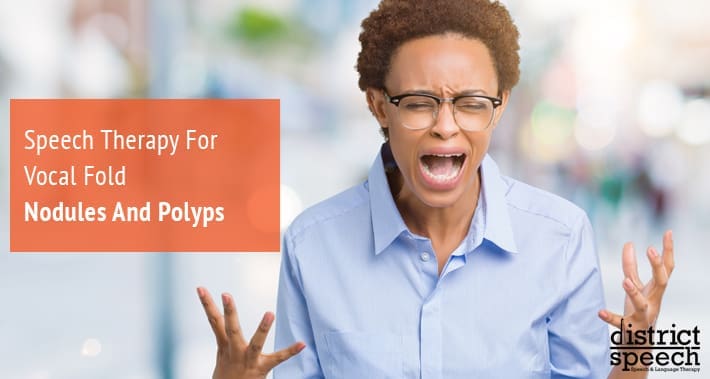
Have you noticed a persistent achiness in your throat?
Maybe you and your loved ones have noticed that your voice sounds raspy.
If you have a job that requires a lot of shouting, you may be straining your voice all the time.
At our Washington DC speech therapy clinic, we often see people with voice issues due to consistent strain on your voice.
This persistent vocal strain can lead to vocal fold nodules or polyps developing on your vocal folds, which are part of your larynx, or your voice box.
To speak, air moves from your lungs and through your vocal folds, which vibrate.
This vibration is what we pick up with our ears as sound.
If something is making it harder for your vocal folds to vibrate, that can cause a problem with your voice.
However, there is help.
Let’s take a closer look at vocal fold nodules and polyps, how they can affect your voice, and how speech therapy for adults can help.
What Is A Vocal Fold Nodule?
Vocal fold nodules are benign growths that form on your vocal folds.
Benign in this context means that the growths are not cancerous.
However, that doesn’t mean they won’t cause you any issues.
Using your voice in a way that strains it can cause your vocal folds to swell.
If it continues, the swollen parts of your voice can get hard and form a nodule.
If you’ve had calluses build on your hands from playing a sport or a musical instrument, it’s a similar idea.
These nodules can get larger over time, exacerbating the issue.
What Is A Vocal Fold Polyp
A vocal fold polyp is more of a swollen spot that forms on one or both of your vocal folds and will usually be bigger than a nodule.
They can look like spots, bumps, blisters, or a long, thin growth.
Other names for vocal fold polyps are Reinke’s edema or polypoid degeneration.
The easiest way to differentiate vocal fold nodules and polyps is to think of nodules as a sort of callous while polyps are closer to a blister.
How To Tell If You Have Vocal Fold Polyps Or Nodules
There are a variety of symptoms that could point to you having vocal fold polyps or nodules.
You may notice yourself developing a rough, harsh, or scratchy sounding voice.
Maybe you experience a hoarseness or breathiness to your voice.
Physically, you might notice a shooting pain in your neck that feels like it’s reaching from ear to ear.
Some people experience a persistent feeling of having a lump in their throat.
Both voice and body tiredness are also symptoms of vocal fold polyps or nodules.
What Causes Vocal Fold Nodules And Polyps?
Vocal fold nodules are usually caused by what is called vocal abuse or misuse, usually over a longer period of time.
Vocal abuse can be something like yelling for an extended time.
While nodules are usually caused by sustained vocal abuse, polyps can form after only one instance of it.
There are many kinds of vocal abuse, including smoking, tensing the muscles in your throat, and frequent yelling.
Allergies, signing, and excess drinking of caffeine and alcohol (which dries out the vocal chords), are also considered vocal abuse.
Other causes of vocal fold polyps include thyroid problems and acid reflux.

Diagnosing Vocal Fold Nodules And Polyps
If your voice has been hoarse or out of sorts for more than a couple of weeks, it’s time to see a doctor.
An ear, nose, and throat doctor may be the most helpful.
To test, your medical team will listen to how your voice sounds as you speak softly and more loudly.
They may see how long you can sustain speech without losing your voice.
It’s likely that they will look at your throat as you make sounds to note how your vocal folds move.
They will do this with an endoscope to look for any nodules or polyps that may be there.
How Can Speech Therapy Treat Vocal Fold Nodules And Polyps?
Speech and language pathologists can be instrumental in helping you treat your vocal fold nodules or polyps.
They can address directly how you are abusing your voice and help you to change your habits.
Speech therapy can teach you vocal hygiene, or how to take care of your voice.
Your speech pathologist will address the underlying structures and functions.
They’ll help you examine the tension in your voice and improve your self awareness.
By providing you with accommodation, support and training, you’ll be on your way to making sure your vocal fold nodules and polyps are no longer bothering you.
Book Your Appointment With District Speech Today
If you’ve suspected you have vocal polyps or nodules, you might be frustrated by how your voice sounds and the pain you may be experiencing.
You don’t have to struggle with your voice by yourself.
With speech therapy, you can be on your way to speech that no longer stresses you out.
Don’t wait, book your appointment with District Speech today.
1300 I St NW, Suite 400 E,
Washington, DC 20005
- https://g.page/districtspeech
District Speech and Language Therapy specializes in speech therapy, physical therapy, and occupational therapy solutions, for both children and adults, in the Washington D.C and the Arlington Virginia areas.